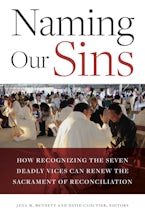- Home
- religion
- philosophy
- Naming Our Sins
Preparing your PDF for download...
There was a problem with your download, please contact the server administrator.
Naming Our Sins
How Recognizing the Seven Deadly Vices Can Renew the Sacrament of Reconciliation
Edited by Jana M. Bennett and David Cloutier
Imprint: Catholic University of America Press
What would it take to renew our ability to name our sins in a meaningful and pertinent way? Naming sins is a particularly important task for Catholic moral theology, but it is one that often falls back into a paradigm of simple violations of rules. While laws and commandments are essential, Vatican II’s universal call to holiness and the revival of virtue ethics require moving further. Yet in part because moral theologians today tend to be lay people, not priests, there has been a de-emphasis on the confession of sins. Contemporary questions like poverty, racism, and abortion are usually connected to questions about sin in some way, but they are disconnected from the idea of naming specific sins in the sacrament of penance. Lay moral theologians raise these issues in a way that makes clear their implications for a parish social justice committee (or the voting booth), but not their implications for the naming of sins in the sacrament of reconciliation. Naming Our Sins proposes to re-make that connection: the moral theologian’s task of helping people name individual sins needs to be restored, though in ways distinctive from dominant pre-Vatican II notions.
In this volume, editors Jana Bennett and David Cloutier gather some of the best of the current generation of moral theologians in order to reflect on the classic tradition of the vices. It is crucial to the Christian understanding of sin that we recognize (a) we bear at least some responsibilities for injuries, and (b) God wants us to participate in the process of healing and conversion. Neither the sin itself nor the healing simply come from somewhere else; the task of naming sins enlists us as mature, growing disciples.
Each chapter takes on a different classical vice, describing the vice, exploring its dimensions in contemporary experience, and moving the reader toward naming specific sins that arise from the vice. The concluding chapters from Catholic priests explore two basic dimensions of the sacrament of penance: liturgical and communal.
Jana M. Bennett is professor of religious studies at the University of Dayton. David Cloutier is associate professor of moral theology/ethics at The Catholic University of America.
"Makes scholarship accessible to readers for whom it may be opaque and/or nonexistent...astutely treats the importance of relationship in an account of naming sins, as well as answering well the challenge of social sin (structural sin) poses to our ability to name sins."
~Kent Lasnoski, author of Vocation to Virute: Christian Marriage as a Consecrated Life (CUA Press)
" Naming Our Sins brings together some of the best qualities of the wine of classical Thomistic moral theology and the new wineskins of post-conciliar renewal. Drawing on a talented group of scholars, both lay and clerical, Jana Bennett and David Cloutier have produced a volume which takes a penetrating look at the subtle ways the seven deadly vices impact our lives, relationships, and the societies in which we live with the aim of enriching and renewing Catholic moral and spiritual life through the sacrament of reconciliation. An outstanding text for undergraduate and seminary level courses in moral theology. Highly recommended."
~John S. Grabowski, The Catholic University of America
"Gluttony, lust, greed, sloth, anger, envy, pride—this book has it all! In seven chapters that interweave the heart of the Christian tradition with contemporary culture, Naming Our Sins brings to life the myriad ways that the interplay between our individual actions and our social context leads to disorder and pain in our lives. Bennett and Cloutier take a crucial first step here in helping to revivify a post-Vatican II vision for a robust, adult practice of reconciliation necessary for the church to be what it’s called to be—a field hospital helping to heal the brokenness of the world. All those who seek spiritual growth and faithful discipleship should read this book."
~M. Therese Lysaught, Loyola University Chicago
"The Catholic confessional still stands as the original "safe space," the singular place where the penitent and God can speak in total secrecy. As a priest who facilitates this dialogue, this collection of essays provides invaluable reflections on the possible origins, corrosive nature, and certain destructiveness of the deadly sins. Drawing on the best of the Great Tradition, from the Church Fathers to the best of contemporary moral theology, these pages should be read by any confessor and spiritual director intent on helping bring God's mercy and wisdom to others."
~Rev. David Meconi, SJ, Saint Louis University; editor of Homiletic & Pastoral Review

